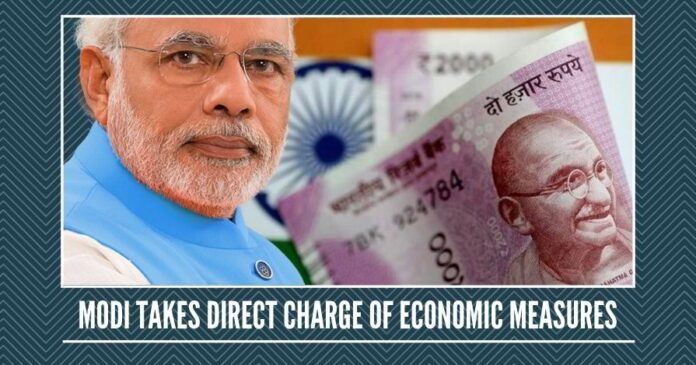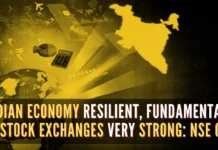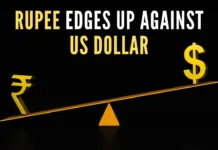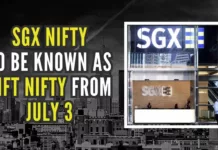
What is expected from Modi and Jaitley is a proper mix of policies designed to protect the economy from “hot” money ravages and from those determined to derail India’s success story.
With the popularity of the Bharatiya Janata Party in danger of getting battered by economic storms, Prime Minister Narendra Modi has taken direct charge of measures needing to be taken to remove volatility and generate growth in the Indian economy. This has been welcomed by the overwhelming majority of Central officials, who are honest and dedicated to the public welfare. They say that intervention by the PM has taken place just in time. Despite improving economic fundamentals warranting a much stronger rupee, India’s currency has been the worst performing in Asia.
Officials (some now retired) who had revealed in 2013 that a secretive cabal headed by a prominent member of the then government was deliberately “shorting” (i.e. bringing down the value of) the rupee, say that the same group is once again active in currency markets. Their intent is to ensure that the rupee falls to as low as Rs 100 to a US dollar by this December, an objective that they are well on the way to achieving. The well-resourced cabal is being assisted by the mechanism of “Exchange Traded Currency Futures” that was strengthened during the UPA period and inexplicably has been allowed to continue even after 26 May 2014. Because they enjoy close ties and credibility with key channels within the business press, it has been easy for this group to spread (through the media) an expectation amongst the public that the rupee is in “free fall”.
Those officials who have declined to join the gravy train of the cabal warn that “the sooner exchange-based currency futures get restricted in India, the better for the stability of the rupee”. They say that the ten years of the UPA period were marked by policies “deliberately designed to make it a cakewalk for global fund managers to make hot money out of markets in India”, and that “too many such policies are still being continued” by North Block, “mainly because the key officials responsible then are still in important positions now”. It ought not to be impossible for investigative agencies to determine exactly what brokerage firms and other financial agencies are involved in the ongoing operation to “short” the rupee, especially through Singapore, Dubai, London, and New York, even though these centers are outside the reach of the Reserve Bank of India. Not that the RBI seems in any rush to do anything about the matter. Thus far, the RBI leadership has not even been making reassuring statements about the currency.
Several officials may themselves function as agents of such cabals, skewing policy responses in order to ensure windfall profits for their hidden benefactors.
MANIPULATION OF PERCEPTIONS
At the same time, “a carefully coordinated volley of op-eds and statements is being generated that is designed to pretend that the rupee is overvalued” even at the present bargain basement rates. A publicly-funded economic think-tank based in Delhi has been at the hub of efforts to generate a herd mentality that would panic currency markets into fleeing the rupee. That even such disruptive mechanisms as derivative trading have not been stopped or sharply regulated thus far is a testimony to the reach of the “Short the Rupee” cabal within elements of the official machinery in both North Block in Delhi as well as Mint Road in Mumbai. An example of manipulation of perceptions about policies and policymakers is the effort to claim that the 2008 global financial crisis bypassed India “because of sound management during 2008-09”.
The reality is that the high proportion of cash in asset purchases in India provided a valuation cushion for institutional lenders, hence the absence of a “sub-prime crisis” in this country. Later, gargantuan volumes of cash were recklessly directed to favored segments in the name of “fiscal stimulus”, and it is a scant wonder that such ailments as bank NPAs began to fester during that period. Skillful management of perceptions has enabled the Insider Vulture Cabal to ensure that several of its most toxic policies continue to operate to the present. As an example, the currency of a country is as much an essential commodity as foodstuffs and other material that are not permitted to be traded on the futures market, in view of the volatility and windfall hot money profits that such operations would generate.
It may be remembered that speculator and regime change specialist George Soros was responsible for single-handedly bringing down the value of the British pound through a sophisticated and comprehensive operation involving short selling on the same lines as has been happening recently to the rupee. Another target of Soros was the Malaysian ringgit. Although corroboration in the form of tangible evidence is difficult to come by, officials anxious about the ongoing effort to slaughter the value of the rupee in the currency markets claim that the Soros organization (which has numerous overt and covert tentacles in India) is “active in bringing down the value of the rupee so as not only to make profits but punish India for continuing to trade with Iran”. Interestingly, Soros himself has been the victim of false reports linking him to the Iranian regime, when he is in fact among its most potent opponents.
CONTINUOUS MONITORING NEEDED
The blind spot in regulatory and monitoring mechanisms in India is the close informal connection between international operators and those responsible for fiscal and monetary policy in India. While the authorities go after small players, major depredators escape. Vijay Mallya transferred much of the loans taken by him to accounts abroad through a private bank with deep connections even within the present establishment. However, this and similar “respectable” institutions have escaped scrutiny so far, perhaps because of the “services” they render to those still well connected even after the 2014 election victory of the BJP.
Officials alarmed at the inaction against rogue elements say that continuous monitoring of the robustness of settlement of exchange-traded futures in currency is essential. If the trading is not robust, the market may face difficulties through concerted action by speculators who have “insider” knowledge of the manner in which India’s fiscal and monetary authorities will act in situations of strain and volatility. Several officials may themselves function as agents of such cabals, skewing policy responses in order to ensure windfall profits for their hidden benefactors.
Unfortunately, in the trusting atmosphere of the higher bureaucracy in India, even in bent members of their own tribe, such saboteurs of the public interest go unpunished and usually undetected, especially because they are present in the regulatory and oversight departments and agencies as well. The record of the CBI, ED, DRI, and other agencies in discovering—much less checking—widespread malpractice in false invoicing of imports and exports is dismal, while as yet the BJP-led government has not taken action even against those VVIPs who openly assisted Vijay Mallya and others in their money transfers out of India. Presumably, such action is another of the lengthy list awaiting 2022.
Unfortunately, several officials seem to be in awe of such institutions, and push for policies beneficial only to them rather than to domestic players.
Another problem area is the NDF (non-deliverable forward) markets operating in Singapore and Dubai. These markets are used by some with Indian passports (including the many with a secret second passport) who have international operations. These take positions in the forex market in India and simultaneously take a counter position in an NDF market. This mechanism is being used now to short the rupee, according to honest officials alarmed at the situation. It may be remembered that a former Union Minister for Finance took the initiative in destroying an Indian-owned commodity exchange that had branches in Dubai and Singapore, a process of destruction that continues to the present through officials loyal to the former minister who remain in high positions or are regularly consulted by the present government despite their close linkages with a former minister known for generating immense profits through market manipulation.
‘AVOID INTERNATIONAL RECOMMENDATIONS’
Prime Minister Narendra Modi has handed back control of the Finance Ministry to Arun Jaitley, who has a 20-hour per day job on his hands to ensure a return to correct rupee values and the ending of uncertainty and volatility caused by operators intent on shorting the rupee and creating headwinds for the economy. In a situation where the RBI leadership (whose record in managing liquidity during the 2016 demonetization left much to be desired) seems to have lost its voice in the crisis, those who have placed their faith in the rupee and in the management skills of Prime Minister Modi are looking for visible and energetic leadership from the Prime Minister through the Union Ministry of Finance.
What is required is to be steady in its macro management and not give an impression of indecision or inaction. Although the lira, real, rand and peso are getting tanked as part of emerging market crisis, both the geopolitical as well as the geo-economic situation facing India is far more favorable, especially in view of Prime Minister Modi’s success in balancing India’s relationship with the two feuding superpowers, China and the US. Both North Block, as well as the RBI, have enough in their toolkits to get out of any speculator-induced crisis.
Steps could include depressing imports and tapping the patriotic community of NRI for the purchase of bonds as in 2013. An amnesty scheme for those nationals still having undeclared assets abroad could be introduced with rates of taxation that are reasonable rather than prohibitive as formerly. “The PM has to deliver solutions that are out of the box”, a senior official said, “and especially avoid the policy box recommended by international financial institutions to fill their own coffers at the expense of producers and consumers in our country”. Unfortunately, several officials seem to be in awe of such institutions, and push for policies beneficial only to them rather than to domestic players, and both Prime Minister Modi as well as his trusted Finance Minister, Arun Jaitley, will need to ensure that such elements be stopped from driving policy in North Block and the RBI.
The financial world is looking to Narendra Modi and to Arun Jaitley for reassurance and vigorous action to ensure that the Indian rupee, as well as the economy in general, be protected from the speculative insider cabal.
RUPEE INHERENTLY STRONG
A potent example of official inaction is the co-location scandal. Through lack of sufficient follow-up by SEBI, the ED, and the CBI, it would appear that those responsible for the “co-location” imbroglio in the National Stock Exchange will escape without significant (if any) penalties. The time limit for sanctioning the prosecution against former officials associated with the imbroglio (and known to be close to a prominent politician) falls due on 20 September, with no movement so far to give the green light. Key players are still holding on to their positions, some even after their names have formed part of charge-sheets. The public stand of many of them is, not surprisingly in view of their links and interests, in the direction of a weaker rupee.
However, the reality is that the rupee is inherently strong, and can be defended with ease merely by effective tweaks in policy than by expending US dollars in its defense. What is needed is to build confidence in the market that the Government of India will not stand supine but will work towards a stable and fair value for the precious rupee. Concerning co-location, there are reports that lease lines and server racks are still connected between select brokers and an exchange, but thus far, the investigative agencies seem to be unwilling to look into such complaints, for reasons that are not clear. However, these may perhaps become clear a few years later, when complaints get filed about the lack of effective action of ED, CBI, and SEBI. Inaction in the face of manipulation of markets by a well-funded and influential cabal led by a prominent politician whose identity and activities are known to every agency, but who (together with his co-conspirators) seems to be beyond accountability.
ACT AGAINST SHORT-SELLERS
The derivative market, which continues to be given a free run despite the risks of such a lack of action, is several times the size of the actual market, and the effort of the cabal is to ensure a global run on the rupee that would result in a sustained tanking of its value. This would severely affect the economy just when the 2019 Lok Sabha elections are around the corner. In macro terms, there are no reasons why this should be so, especially in view of the cordial relations that exist between the teams led by President Donald J. Trump and Prime Minister Modi, as well as the new bonhomie with China after the Wuhan summit between Xi Jinping and Modi.
Officials supportive of measures to clean up the rot within the regulatory system say that it would be “child’s play to identify and take action against short-sellers” of the rupee, and to “warn global speculative financial enterprises that their India operations would be impacted by any measures taken to worsen the situation relating to the Indian currency” in global markets. Overall, the health of the economy is good and is improving. What is needed is a proper mix of policies designed to protect the economy from “hot” money ravages and from those determined to derail India’s success story. The financial world is in particular looking to the Prime Minister and to the Union Finance Minister, Arun Jaitley for reassurance and vigorous action to ensure that the Indian rupee, as well as the economy in general, be protected from the speculative insider cabal that has long been adept at misusing the system for gain amounting to billions of US dollars annually.
Note:
1. The views expressed here are those of the author and do not necessarily represent or reflect the views of PGurus.
- A Biden-Harris ticket would energise Democrats - March 24, 2020
- Warzones heat up as US-China conflict continues - November 25, 2019
- Modi 2.0 overcoming PC network’s sabotage of economy: Experts - October 14, 2019











Well, I am confused. Pgurus in as many articles picturised Arun Jaitely as the villain and now sings songs in his praise. kindly clarify your stand.
Swift Action on a war footing is to be undertaken to correct the situation. However, if the INTENT is lacking, then nothing can be achieved.
It is very hard to believe that Modi sitting in the highest office of the country and who can have the best advisors at his beck and call, cannot correct the situation!
Sage advice from the likes of Dr. Subramanian Swamy and Prof. Nalapat should be heeded and they perhaps could be given advisory roles to improve the situation.
Well, is Mr Arun Jaitley in favor of action against the corrupt? If not, how Modi can fix it?
Why not Modi give a powerful committee led by Subramanyam Swamy and many economists to discuss and arrive at a decision and implement the decisions forthwith, without any delay and set right the economic condition of our country. If there are crooks in the system and arrest them and put in jail. Enact laws or ordinances if required for doing such hard actions.
That’s right , bottom line is people want results , when Dr SS says he can bring the $ to 35 , Petrol to Rs 40 /litre there is a must be an element of truth in it .Why didn’t they explore before escalating the prices . I mean there is no confluence of ideas amongst economists !! Inspite of having many others in the Minsitry , calling themselves public servants in the Ministries .Shear misuse of power & ulterior motives ? or lack of cognisance is the sole reason . Lot of guts and willingness to bring change to help common man ! All of these !!
I see that over the past couple of years, very regularly every scam and scamster and their links have been brought out in the open here.. Despite the clear solutions, we live where we are today.. No changes.. Modi is possibly the best bet we had.. we have used it.. But the best bet refuses to do what is best.. It cannot be lack of ability but only lack of intent..
If playing politics the same way as the country had seen for decades is the way to stay in power for the best bet india has for the PM’s chair then it is pity.. Modi is one man whom the country trusts even when he takes drastic actions which hurt the common man.. Demonetisation is the example.. The hope that it will deliver because Modi is behind was supreme..
He did not have the courage to live it through and clamp it hard.. If he had come down hard on the black money hoarder, every existing biggie would have been down under.. But he had no alternative to back up too..
Here too, he fails to put an alternative in place should his existing team revolt for a tough option politically. This is where Arun Jaitley is playing his chances right in a game of poker.. Modi is too lonely at the top.. The party has barely enough good hands.. Modi is at the mercy of mediocre and the corrupt within the BJP..
He does not have the will and guts to take this fight to the last..
Wonder what will modi speak to the people i May 2019 on corrupt and black money.. He has serious trouble ahead for the indecisiveness he shows to kick the butt of the crooks..
Modi is not dictator to fix everything with a magic wand. In a democratic country, there are laws, departments and procedures to handle things. We cannot bypass them.